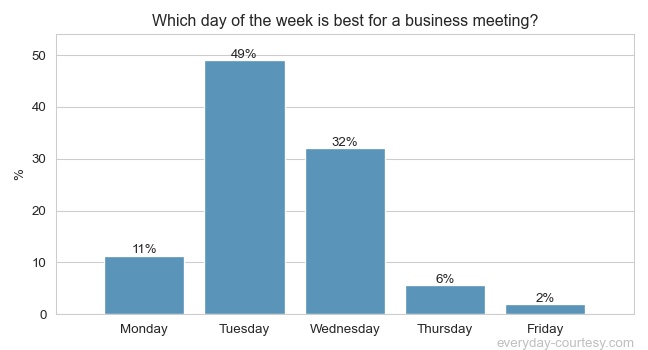If you’re trying to schedule a business meeting, you may have wondered which day of the week would be best.

We found that Tuesdays were the most popular day for business meetings. We also discovered that Friday was the worst day for a business meeting because people are less likely to want to commit or cancel on Fridays due to weekend plans or other reasons.
Which Day of the Week Is Best for a Business Meeting?
Our survey found that almost half of people (49%) say Tuesday is their favorite day for attending a business meeting. Wednesday is the second most popular day.

While Friday afternoons have a reputation for being inefficient, Wednesday mornings are considered productive when many people are fresh and ready to get into their work routines.
Additionally, it’s often easier to plan a meeting on a weekday than on weekends and if you need your employees present to complete their tasks, scheduling a weekday event could be crucial.
The data shows that Tuesday is becoming increasingly popular as people adjust their schedules around school/work demands and family commitments over weekends.
Scheduling meetings during these times would not only keep everyone involved accountable but also allow those who require greater flexibility due primarily to family matters.
Considerations When Scheduling a Business Meeting
Will this meeting involve multiple companies or groups? If so, which day of the week is best for everyone involved? Do your employees have any preferences about when they meet with clients?
Consider whether or not employees may need time off work before or after the meeting itself. While this may happen regardless of which day you choose, there might be more flexibility with certain days than others.
Will It Be In-Person or Virtual?
If you are planning a virtual meeting with your team, any day of the week is good for scheduling.
If you want the meeting to be in-person, it’s best to schedule it around 10:00 am.
See also: [Survey] What Is the Best Time to Schedule a Business Meeting?
This is because people are more likely to attend meetings during those times than at other parts of the day.
For example, most people have morning routines that include getting ready for work and driving in traffic-so they’re less likely to take time out of their day if they don’t need to. If you have an important project or presentation coming up, though (and let’s face it: we all do!), then this can be helpful!
How Long Should the Meeting Last?
So, how long should your meeting be? Well, the answer to that question depends on a few things. First, you need to consider the length of time you’ve scheduled your meeting and what kind of agenda you have for that day.
If you’re holding a brainstorming session or planning something big, then chances are that it’ll take longer than usual. You also want to ensure everyone involved has enough time to share their thoughts and discuss any issues with one another while not taking up too much of their day (or yours).
Generally speaking, though, we recommend starting with around 30 minutes per person so everyone understands what they’re doing before moving on to anything else while keeping things interesting throughout.
See also: [Survey Result] How Long Should a Virtual Meeting Last?
Monday Comes in Third
Monday is a common day to schedule meetings, but it’s not the best. Monday comes in third, with 11% of respondents favoring it.
It’s a bad day to schedule meetings because it’s the start of the work week, and people are still recovering from their weekend activities.
On top of that, most people are also still adjusting to their Monday morning routine. They may be less likely to attend a meeting on this day of the week.
Why Monday May Be a Bad Day for a Business Meeting
Monday is the day most people dread. It’s the start of a new week, and people are still returning to their routine after the weekend. In addition, it’s a more common day for meetings because you want to start fresh on Mondays and get things done early to be ahead of schedule for Friday (or at least, that’s what we tell ourselves).
Add in the fact that Monday is often seen as an “early start” day, so you tend to have less energy than usual-not what you want if you’re hosting an important meeting!
Why Do Many People Prefer Meetings to Be Held Midweek?
Most people have a regular schedule, making it easier to attend midweek meetings. If you’re trying to get as many people as possible at a meeting, scheduling it mid-week will help facilitate this goal. [1]
The last reason why many business owners prefer weekday meetings is that they can get more done during business hours without worrying about taking time off or working late into the evening (or early morning).
Tips for scheduling meetings in ways that increase attendance
- Choose a day when you are most likely to be available.
- Choose a time that is convenient for all attendees.
- Choose a location that is convenient for all attendees.
- Choose a time zone that is convenient for all attendees.
Different Situations Warrant Different Days
There are many factors to consider when scheduling a business meeting. Here are some of the most common situations and how they affect your choice of the day:
In-person meetings: Tuesdays are the best for in-person meetings because people are typically ready to work after their weekend. But Wednesdays can be good too! The key is to keep it short, so no one feels like they have to rush out the door on Friday night. [2]
Virtual meetings: While Tuesday and Wednesday might be best for in-person meetings, Friday and Thursday are options for virtual ones. Since everyone will already have established their routine by then, they’ll be less likely to miss important details. Plus, it’s easier than ever, thanks to all those apps like Zoom or Slack!
Conclusion
The answer is that Tuesday is the best day to schedule a meeting.
However, the decision should be guided by what you and your colleagues need from it and the takeaway for us is that there are so many factors involved in choosing the perfect day, but there are still some general rules to follow when scheduling a business meeting; for example: make sure everyone knows about it beforehand!
References:
[1]: https://hbr.org/2021/11/the-psychology-behind-meeting-overload
[2]: https://www.psychologytoday.com/us/blog/mind-the-manager/202201/

Matt Vargas is an author and public speaking coach with a degree in sociology and more than ten years of practical experience. Matt is responsible for the empirical surveys at everyday-courtesy.com, is a passionate recreational musician, and blogs here about his experiences in the field of interpersonal communication.

